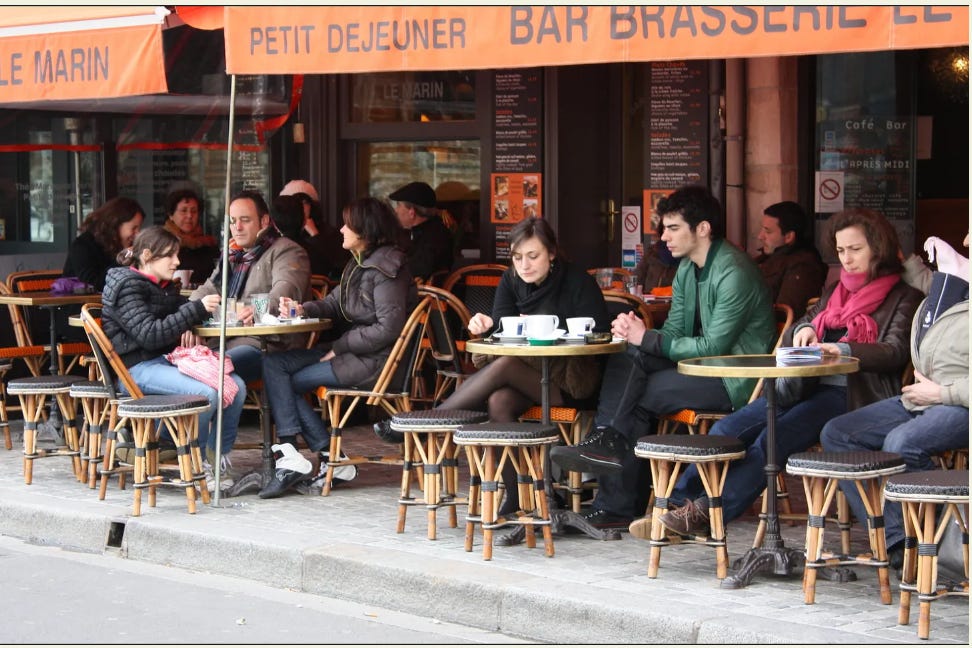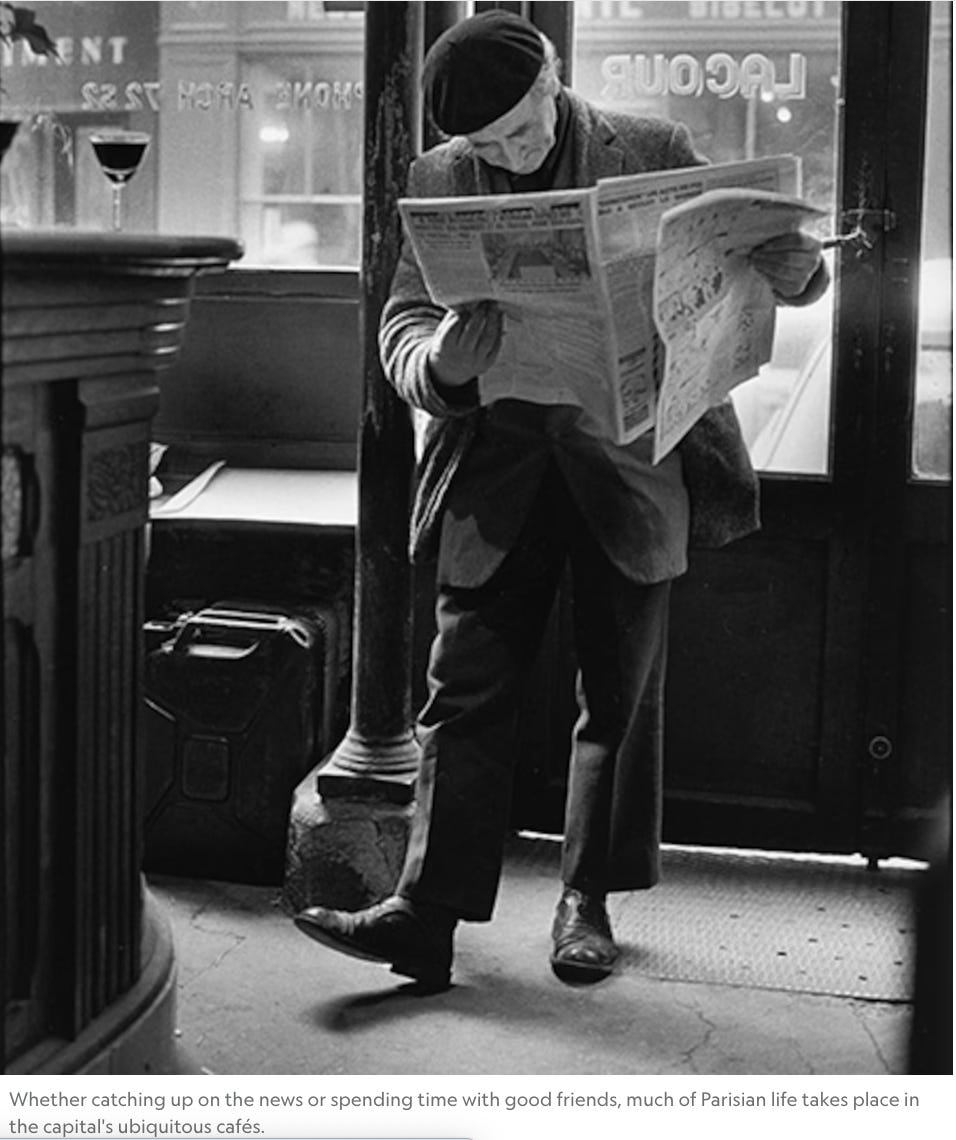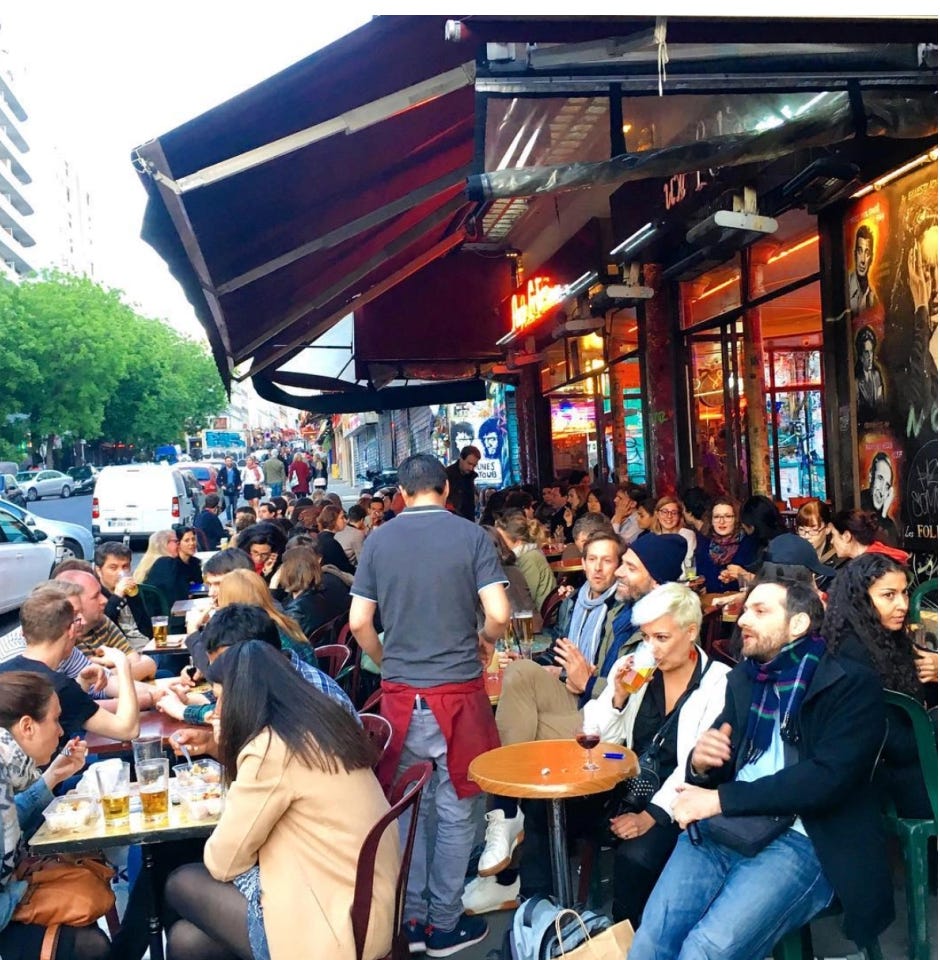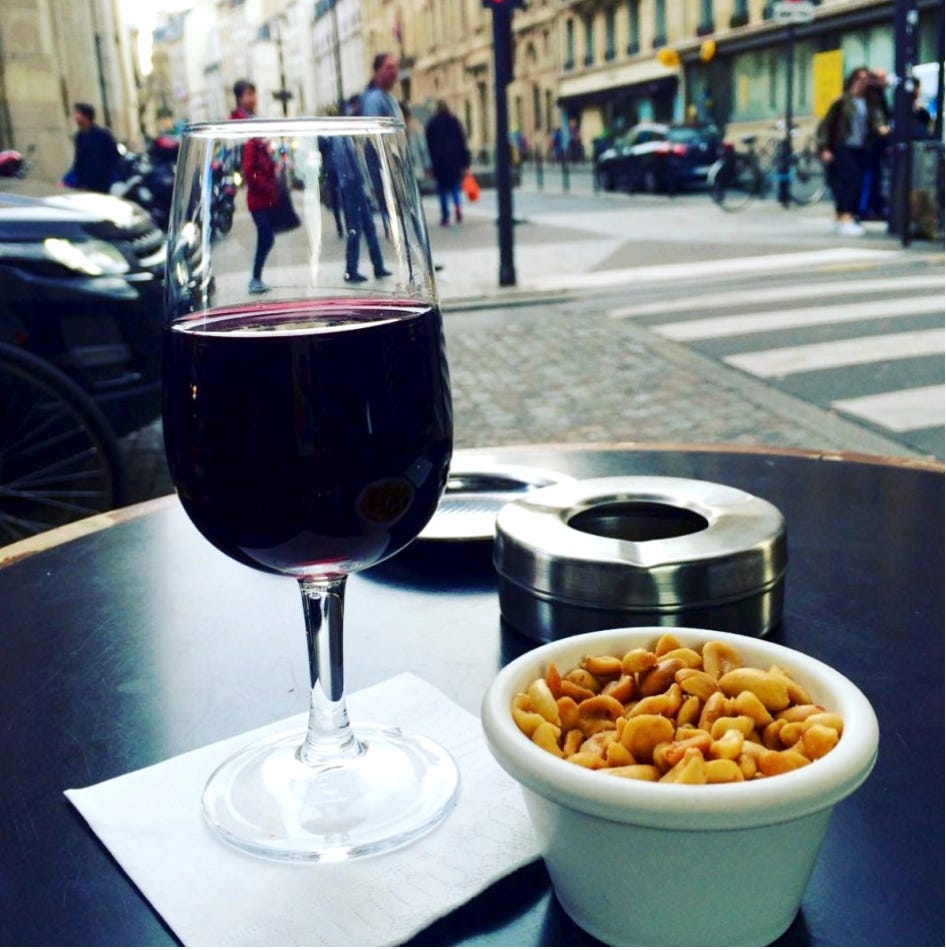15.07.a - The sacred art of people-watching; eaves-dropping, & talking-to-strangers in France
In this PAID le Bulletin discover the unwritten rules of French social life: art of café people-watching to the delicate etiquette of eavesdropping & striking up conversations with strangers in France

Today at a Glance: your PAID weekly newsletter
Bonjour mes amis—new and long-time supporters and friends…
I’m thrilled you’re here with me again this week—bienvenue—welcome.
Once again, I thank you for your financial support, which enables me to continue producing these two newsletters weekly!
Here’s what you’ll discover today:
This week, we're stepping behind the scenes into how people in France ‘people watch’, ‘eavesdrop’, and ‘talk to strangers’. Are these behaviours considered rude? Let’s see…
What’s happening in MyFrenchLife Magazine - new articles to read, that celebrate the mastery of French craft: Cuisine and Maritime Heritage.
Delighted by today's journey? Here's how to deepen your French connection:
🔓 UNLOCK MORE FRENCH STORIES - Never miss an intimate story from our French correspondents - Save with an annual subscription
⭐ BECOME A CHERISHED MIGHTY SUPPORTER - Help bring more exclusive French stories to life - Get special access to real French lives beyond the cliché
🎁 SHARE THE JOURNEY - Gift le Bulletin to friends and family who dream of France - Give them weekly authentic French stories in their inbox
💡 Did you know? Access our complete archive anytime—dive into real-life French stories whenever wanderlust strikes any time of the day or night wherever you live
Warm regards
Judy - 15.2.2025
1. →Your Weekly French Life: Indulging in being alone while surrounded by French strangers, then talking to them.

I have an addiction. Well, perhaps more than one ;)
I admit that I have long been a people-watcher, are you?
→In french: “observant les passants”
I’m not a gossip, but I love to observe people, everywhere. I love to watch behaviour: human interaction of all sorts. I love to observe how people dress, carry themselves, and connect with others. It fascinates me! People fascinate me!
I also eavesdrop, do you?
→ In French: to eavesdrop on somebody “écouter quelqu’un (de façon indiscrète)”
I admit that I often listen to conversations in cafes and restaurants. And I enjoy my habit even more in France, where the tables are so close. I must strain my ear somewhat because French people usually speak in a soto voice.
And
I’ll also admit that I’m becoming more of a talk-to-strangers person than I’ve ever been. I’m an adapted introvert, you see, so this has not been my natural behaviour… until recently ;)
But what’s rude and what’s not? What are the codes?
Understanding French etiquette and cultural differences, broadening our thinking, and appreciating a place by way of different perspectives… isn’t that the reason why we travel in the first place?
Let’s quickly look at a few cultural differences.
Communication—Verbal
Communication Style: The way a French person communicates is often determined by their social status, level of education, age, and which part of the country they were raised in. Tone and choice of words will vary among these factors. Generally, they will communicate in French, but some may use their regional dialect.
Direct Communication: The French tend to be very direct. One reason for this is that the French language is quite precise; thus, it is difficult not to be direct when using it. This direct style of communicating has often been misunderstood as rude by expatriates or tourists, especially if one is not used to forthrightness. This direct communication style is seen by the French as diplomatic and polite rather than ill-intentioned.
Debating: The French generally dislike public disagreements or disputes, but enjoy a controlled debate. Logic will often dominate their arguments and many French people tend to analyse the matter under discussion extensively. They may recognise something illogical said by the opposition, and informed rebuttal is generally appreciated.
Compliments: Compliments are often appreciated, but will usually be received by humble denial instead of a ‘thank you’.
Formality: In French, different forms of expression indicate the level of courtesy and formality. The polite form of speech is to address people in the formal form of ‘you’ (known as ‘vous’). The informal address known as ‘tu’ is used in various contexts. Generally, it is considered disrespectful to use ‘tu’ when first meeting someone in France. ‘Tu’ is only appropriate with one’s family or friends. It is also common in Francophone countries.
Humour: The French tend not to tell punchline jokes. They prefer witty, satirical, and ironic humour. Humorous stories of real-life situations are appreciated as well as self-deprecating humour.
Communication—Non-Verbal
Physical Contact: Touching during a conversation is accepted and considered a sign of affection only once you have reached a degree of familiarity. Young people will often engage in public displays of affection, such as embracing or kissing.
Personal Space: An arm’s length of distance or a bit closer is an appropriate amount of personal space.
Eye Contact: Direct eye contact is understood as a form of respect. It is considered to be extremely rude not to make and maintain eye contact.
Gestures: French people tend to use a thumbs up, or a circle made with the thumb and index finger, to indicate ‘okay’.

The French cafe is the centre of community life in France. About 10 years ago there was a huge push to ‘Save the Paris cafes’. The problem is not only in Paris but across the country.
Despite the popularity of cafés, they have been closing. France has seen a steady decline in the number of cafés overall—from 200,000 nationwide in 1960 to about 35,000 today.* In Paris, some sources cite* that the number of cafés has dwindled from 45,000 in 1880 to around 7,000. Yet more startling: since 2014 Paris has lost nearly 400 cafés† —and more are closing every month.” stated by the Save the Cafe website and its collective of writers.
Janet Hulstrand was one of the collective who wrote in support of cafes.
→The Paris cafe: A place to be alone with others.
by Janet Hulstrand
On the ‘Save the Paris’ cafe website site, Janet Hulstrand writes about Paris and French cafes, touching on today’s topics.

While not necessarily considered "rude" in France, initiating conversation with strangers is generally considered less common and can sometimes make people feel uncomfortable, as French culture tends to value personal space and privacy, especially with people they don't know well; so, it's best to be mindful of social cues and avoid overly personal conversations with strangers.”
…”Each summer, I assign the American students in my literature class in Paris to find a café that looks sympa to them, and then to spend at least half an hour there. (“Longer is better,” I say.) I tell them they don’t have to order more than a cup of coffee, or a glass of wine if they don’t want to, or can’t afford to.
Then they are to spend at least some of their time there writing about what they see, hear, observe, or think about. I give them this assignment fairly early in their month-long stay in Paris because I want them to know that this is something they can do in Paris even if they are there on a very tight budget. And I want them to understand through personal experience that it is indeed one of the most wonderful things Paris has to offer them—and everyone….” writes Janet Hulstrand.
Let’s now hear some more stories and find out if these behaviours are Anglo habits or do French people also indulge.
Allons - y ! Let’s go!


